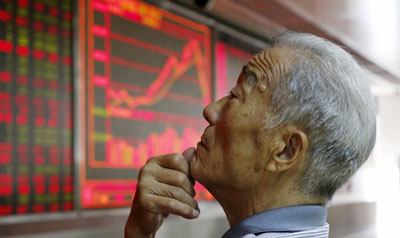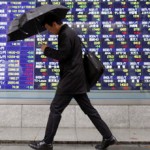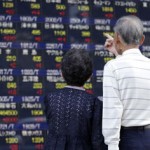Asian stocks decline as China twin PMIs sap risk appetite

Asian stocks declined on Tuesday, as losses on Wall Street overnight and new manufacturing data out of the world’s second-largest economy curbed risk appetite.
China’s official manufacturing purchasing managers’ index (PMI) edged down to 49.7 in August from 50 in July, just below the 50-mark that separates expansion from contraction. Separately, the final Caixin/Markit manufacturing purchasing managers’ index (PMI) came in at 47.3 in August, above a preliminary reading of 47.1 but down from 47.8 in July.
“The data is hardly new. China’s economic data have been weak for a long time,” said Pruksa Iamthongthong, investment manager at Aberdeen Asset Management, who has an underweight call on Chinese equities.
“We do see a fair bit of bloodbath in other sectors and across the market”, she told CNBC’s “Street Signs Asia” on Tuesday.
Overnight, U.S. equity markets ended in the red to chalk up their worst month since 2012. The Nasdaq Composite closed down 1.07 percent, while the Dow Jones Industrial Average and S&P 500 dropped 0.69 and 0.84 percent, respectively.
In early Asian trade on Tuesday, S&P futures eased 1.1 percent while Dow futures fell 190 points.
Mainland markets extend losses
China’s benchmark Shanghai Composite index dropped 1.7 percent at the start of the afternoon trading session.
In the previous session, the key stock index closed down 0.8 percent to chalk up a loss of 12.5 percent for August, marking its third straight month of declines. The Shanghai bourse lost 14 percent in July – its biggest monthly drop since August 2009.
Among losers, Bright Dairy & Food slumped more than 5 percent after the announcement of a weak first-half net profit prompted a downgrade of the stock from “outperform” to “underperform” by Credit Suisse.
Bucking the downtrend, heavyweight PetroChina and Sinopec rose more than 3 percent each, on the back of a rebound in oil prices overnight.
However, not all analysts are bearish on the mainland’s stock market. LGT Bank Singapore’s Simon Grose-Hodge, for one, calls the recent sell-off “overdone.”
“It’s been sentiment-drive, and not fundamentally-driven, hence this is a correction we think should be bought into, rather than the beginning of a bear market or something more serious,” the head of investment advisory at LGT Bank Singapore told CNBC.
“The [PMI] numbers aren’t great but they are expected. What’s important is we are starting to see more reaction from China like the double rate cut in August. With the one-year lending rate still at 4.6 percent, there’s a ton of room for further traditional moves,” Grose-Hodge added.
Among China’s other indexes, the blue-chip CSI300 and smaller Shenzhen Composite receded 1.9 and 3.5 percent, respectively.
Hong Kong’s Hang Seng index notched down 0.7 percent on the first trading day of September. For August, the Hang Seng index lost 12 percent, its fourth straight month of decline and the worst performance since September 2011.
Source: CNBC – Asian stocks decline as China twin PMIs sap risk appetite



























